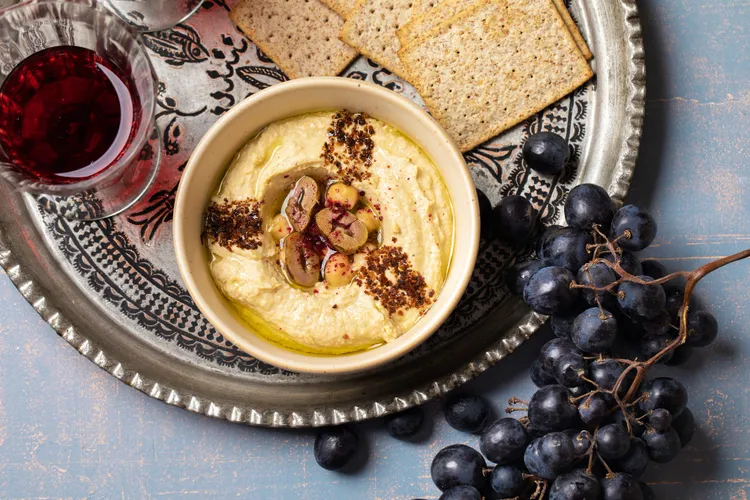The Mediterranean Diet: Your Guide to a Heart-Healthy, Delicious Lifestyle
The Mediterranean diet is more than just a diet - it’s a way of life inspired by the traditional eating habits of countries bordering the Mediterranean Sea, such as Greece, Italy, Spain, and France. Renowned for its health benefits, vibrant flavors, and sustainability, this dietary pattern has been consistently ranked as one of the world’s healthiest diets. Backed by decades of scientific research, the Mediterranean diet is celebrated for promoting heart health, longevity, and overall well-being while being flexible and enjoyable. We’ll dive deep into what the Mediterranean diet is, explore its health benefits, break down its key components, and provide simple, practical ways to start incorporating it into your life. Whether you’re looking to improve your health, enjoy delicious meals, or adopt a sustainable eating pattern, this guide will equip you with everything you need to embrace the Mediterranean way of eating. Let’s get started!

What Is the Mediterranean Diet?
The Mediterranean diet is a dietary pattern based on the traditional foods and lifestyles of Mediterranean region populations, particularly those studied in the mid-20th century. It emphasizes whole, minimally processed foods, plant-based ingredients, and healthy fats, with a focus on balance, moderation, and enjoyment. Unlike restrictive diets, it’s flexible and adaptable, making it suitable for diverse cultures and preferences.
The diet gained global attention after the Seven Countries Study in the 1960s, which linked the eating habits of Mediterranean populations to lower rates of heart disease. Since then, countless studies have reinforced its benefits, cementing its status as a gold standard for healthy eating.
Core Principles of the Mediterranean Diet
- Plant-Based Focus: Vegetables, fruits, whole grains, legumes, nuts, and seeds form the foundation of meals.
- Healthy Fats: Olive oil is the primary fat source, replacing butter and processed oils.
- Moderate Protein: Fish, poultry, eggs, and dairy (like yogurt and cheese) are consumed in moderation, with red meat eaten sparingly.
- Low Processed Foods: Emphasis on whole, unprocessed ingredients, with minimal reliance on packaged or sugary foods.
- Flavor with Herbs and Spices: Fresh herbs, garlic, and spices reduce the need for excess salt.
- Wine in Moderation: Optional small amounts of red wine with meals, if appropriate for your health and lifestyle.
- Social and Active Lifestyle: Meals are enjoyed with family and friends, paired with regular physical activity.
The Mediterranean diet isn’t about strict rules or calorie counting - it’s about creating a sustainable, enjoyable way of eating that nourishes both body and soul.
Health Benefits of the Mediterranean Diet
The Mediterranean diet is backed by robust scientific evidence, with studies linking it to a wide range of health benefits. Here are some of the most notable:
- Heart Health: The diet’s emphasis on healthy fats (like olive oil and omega-3s from fish), fiber, and antioxidants reduces the risk of heart disease, lowers LDL (“bad”) cholesterol, and improves blood pressure. The PREDIMED study (2013) found that the Mediterranean diet reduced cardiovascular events by 30% in high-risk individuals.
- Improved Longevity: Populations following the Mediterranean diet, such as those in “Blue Zones” like Sardinia, tend to live longer, healthier lives.
- Weight Management: The diet’s focus on whole foods and balanced macronutrients promotes satiety and sustainable weight loss or maintenance without feeling deprived.
- Reduced Risk of Type 2 Diabetes: High fiber, low glycemic index foods, and healthy fats improve insulin sensitivity and blood sugar control.
- Brain Health: Antioxidants and omega-3s protect brain cells, potentially reducing the risk of cognitive decline, Alzheimer’s disease, and depression.
- Anti-Inflammatory Benefits: The diet’s nutrient-dense foods reduce chronic inflammation, a root cause of many diseases.
- Gut Health: High fiber from plants and fermented foods like yogurt support a healthy gut microbiome.
- Cancer Prevention: Some studies suggest the diet’s antioxidant-rich foods may lower the risk of certain cancers, such as breast and colorectal cancer.
Beyond physical health, the Mediterranean diet promotes mental well-being through social dining and a relaxed approach to food, reducing stress and enhancing life enjoyment.
Key Components of the Mediterranean Diet
To understand how to adopt the Mediterranean diet, let’s break down its core food groups and recommended intake:
- Vegetables and Fruits
- What: Leafy greens (spinach, kale), tomatoes, zucchini, eggplants, peppers, onions, carrots, apples, oranges, berries, figs, and more.
- How Much: Aim for 5–9 servings daily (1 serving = 1 cup raw or ½ cup cooked vegetables; 1 medium fruit).
- Why: Provide fiber, vitamins, minerals, and antioxidants to reduce inflammation and support overall health.
- Whole Grains
- What: Whole wheat, barley, farro, quinoa, brown rice, oats, and whole-grain pasta or bread.
- How Much: 3–6 servings daily (1 serving = ½ cup cooked grains or 1 slice bread).
- Why: Deliver complex carbohydrates for sustained energy and B vitamins for metabolism.
- Legumes
- What: Lentils, chickpeas, beans (e.g., cannellini, kidney), and peas.
- How Much: At least 3 servings per week (1 serving = ½ cup cooked).
- Why: High in protein, fiber, and iron, making them a plant-based protein staple.
- Nuts and Seeds
- What: Almonds, walnuts, pistachios, hazelnuts, chia seeds, flaxseeds, and sesame seeds.
- How Much: A handful (1–2 ounces) daily or several times per week.
- Why: Provide healthy fats, protein, and vitamin E for heart and brain health.
- Healthy Fats
- What: Extra virgin olive oil, avocados, and olives.
- How Much: Use olive oil as the primary fat (2–4 tablespoons daily); include avocados/olives regularly.
- Why: Monounsaturated fats reduce bad cholesterol and inflammation.
- Fish and Seafood
- What: Fatty fish (salmon, mackerel, sardines), white fish (cod, haddock), and shellfish (shrimp, mussels).
- How Much: At least 2–3 servings per week (1 serving = 3–4 ounces cooked).
- Why: Rich in omega-3 fatty acids for heart and brain health.
- Poultry, Eggs, and Dairy
- What: Chicken, turkey, eggs, Greek yogurt, and cheeses like feta or Parmesan.
- How Much: Poultry and eggs 2–4 times per week; dairy in moderation (e.g., 1–2 ounces cheese or 1 cup yogurt daily).
- Why: Provide protein, calcium, and probiotics (in yogurt) for muscle and gut health.
- Red Meat
- What: Beef, pork, lamb.
- How Much: Sparingly, 1–2 servings per month (1 serving = 3 ounces cooked).
- Why: High in iron and protein but limited due to saturated fat content.
- Herbs and Spices
- What: Basil, oregano, rosemary, thyme, garlic, turmeric, and cinnamon.
- How Much: Use generously to flavor dishes.
- Why: Enhance taste without excess salt and provide antioxidants.
- Wine (Optional)
- What: Red wine, consumed with meals.
- How Much: 1 glass (5 ounces) daily for women, up to 2 for men, if appropriate for your health.
- Why: Contains antioxidants like resveratrol, but moderation is key.
- Water and Hydration
- What: Water, herbal teas, and small amounts of coffee.
- How Much: Aim for 8–10 cups of water daily.
- Why: Supports digestion, hydration, and overall health.
Foods to Limit
- Processed Foods: Packaged snacks, fast food, and refined grains (white bread, pasta).
- Added Sugars: Sugary drinks, desserts, and candies.
- Trans Fats: Margarine, processed oils, and fried foods.
- Excess Salt: Canned soups, processed meats, and salty snacks.
Simple Ways to Start the Mediterranean Diet
Transitioning to the Mediterranean diet doesn’t have to be overwhelming. Here are 10 simple, practical steps to begin incorporating its principles into your life, even if you’re starting from scratch:
- Swap Butter for Olive Oil
- Why: Extra virgin olive oil is the heart of the Mediterranean diet, rich in monounsaturated fats and antioxidants.
- How to Start:
- Drizzle olive oil over salads, roasted vegetables, or grilled fish.
- Use it for sautéing or as a dip with whole-grain bread and herbs.
- Replace butter with olive oil in baking recipes (use ¾ cup oil for 1 cup butter).
- Tip: Choose “extra virgin” olive oil for maximum flavor and health benefits. Store in a cool, dark place to preserve quality.
- Eat More Vegetables at Every Meal
- Why: Vegetables are nutrient-dense, low-calorie, and high in fiber, making them a cornerstone of the diet.
- How to Start:
- Add spinach or tomatoes to your breakfast eggs or smoothie.
- Fill half your lunch and dinner plate with veggies (e.g., roasted zucchini, steamed broccoli).
- Snack on raw veggies like carrots or bell peppers with hummus.
- Tip: Prep veggies in advance (chop and store in containers) to make them easy to grab.
- Incorporate Fish Twice a Week
- Why: Fish, especially fatty varieties, provide omega-3s that support heart and brain health.
- How to Start:
- Try canned sardines or salmon on whole-grain toast for a quick lunch.
- Bake salmon fillets with lemon, garlic, and olive oil for dinner.
- Experiment with shrimp stir-fries or grilled cod with herbs.
- Tip: If fresh fish is expensive, opt for frozen or canned (in water or olive oil) for affordability and convenience.
- Switch to Whole Grains
- Why: Whole grains provide sustained energy and fiber, unlike refined grains that spike blood sugar.
- How to Start:
- Replace white rice with brown rice, quinoa, or farro.
- Choose whole-grain bread or pasta for sandwiches and dinners.
- Start your day with oatmeal topped with fruit and nuts.
- Tip: Look for “100% whole grain” on labels to avoid partially refined products.
- Add Legumes to Your Meals
- Why: Legumes are affordable, protein-rich, and versatile, reducing reliance on meat.
- How to Start:
- Toss chickpeas into salads or blend them into hummus.
- Make a lentil soup with vegetables and herbs for a hearty meal.
- Use beans in wraps, bowls, or as a side dish.
- Tip: Rinse canned legumes to reduce sodium, or cook dried beans in bulk for cost savings.
- Snack on Nuts and Fruits
- Why: Nuts and fruits are nutrient-dense snacks that curb hunger and provide healthy fats and antioxidants.
- How to Start:
- Keep a small container of almonds or walnuts at your desk.
- Pair an apple or orange with a handful of nuts for a balanced snack.
- Blend frozen berries into a smoothie for a sweet treat.
- Tip: Stick to a 1-ounce serving of nuts (about a handful) to manage calories.
- Reduce Red Meat Consumption
- Why: Limiting red meat lowers saturated fat intake and aligns with Mediterranean principles.
- How to Start:
- Designate 1–2 days per week as “meatless” and focus on fish, legumes, or poultry.
- Use small amounts of lean beef or lamb as a flavor accent in dishes like stews.
- Try plant-based proteins like tofu or tempeh for variety.
- Tip: When eating red meat, choose lean cuts like sirloin and pair with plenty of vegetables.
- Flavor with Herbs and Spices
- Why: Herbs and spices add flavor without excess salt or calories and provide antioxidants.
- How to Start:
- Season dishes with fresh basil, oregano, rosemary, or thyme.
- Use garlic and lemon juice to enhance fish, chicken, or veggies.
- Experiment with spice blends like za’atar or harissa for Mediterranean flair.
- Tip: Grow a small herb garden (e.g., basil or parsley) for fresh, budget-friendly flavor.
- Enjoy Meals Socially
- Why: The Mediterranean lifestyle emphasizes shared meals, which reduce stress and enhance enjoyment.
- How to Start:
- Eat at least one meal daily with family or friends, free from screens.
- Host a Mediterranean-inspired dinner with simple dishes like grilled fish, hummus, and salads.
- Savor meals slowly to appreciate flavors and improve digestion.
- Tip: Create a relaxed dining atmosphere with music or candles to mimic Mediterranean culture.
- Stay Active and Hydrated
- Why: Physical activity and hydration are integral to the Mediterranean lifestyle, supporting overall health.
- How to Start:
- Aim for 30 minutes of moderate activity (e.g., walking, yoga) most days.
- Carry a reusable water bottle and aim for 8–10 cups of water daily.
- Sip herbal teas or infuse water with lemon and mint for flavor.
- Tip: Incorporate movement into daily routines, like walking during lunch breaks or stretching at home.
Sample Mediterranean Diet Meal Plan for a Week
To help you visualize the diet in action, here’s a simple 7-day meal plan:
Monday
- Breakfast: Greek yogurt with berries, walnuts, and a drizzle of honey.
- Lunch: Quinoa salad with chickpeas, cucumber, tomatoes, feta, and olive oil dressing.
- Snack: Carrot sticks with hummus.
- Dinner: Baked salmon with roasted zucchini and whole-grain couscous.
Tuesday
- Breakfast: Oatmeal with sliced apple, cinnamon, and almonds.
- Lunch: Whole-grain wrap with grilled chicken, spinach, and tzatziki.
- Snack: Orange and a handful of pistachios.
- Dinner: Lentil soup with a side of whole-grain bread and olive oil dip.
Wednesday
- Breakfast: Scrambled eggs with spinach and tomatoes; whole-grain toast.
- Lunch: Tuna salad with mixed greens, olives, and olive oil vinaigrette.
- Snack: Sliced pear with a small piece of Parmesan cheese.
- Dinner: Grilled shrimp skewers with roasted peppers and farro.
Thursday
- Breakfast: Smoothie with spinach, banana, Greek yogurt, and chia seeds.
- Lunch: Hummus and veggie bowl with roasted eggplant and quinoa.
- Snack: Handful of almonds and dried figs.
- Dinner: Roast chicken with sweet potatoes and steamed broccoli.
Friday
- Breakfast: Whole-grain toast with avocado and a poached egg.
- Lunch: Sardine salad with arugula, lemon, and whole-grain crackers.
- Snack: Apple slices with almond butter.
- Dinner: Baked cod with tomato-basil sauce and brown rice.
Saturday
- Breakfast: Greek yogurt parfait with granola and fresh peaches.
- Lunch: Mediterranean pasta salad with cherry tomatoes, olives, feta, and olive oil.
- Snack: Bell pepper strips with guacamole.
- Dinner: Grilled turkey meatballs with roasted asparagus and barley.
Sunday
- Breakfast: Frittata with zucchini, onions, and feta; side of fruit.
- Lunch: Chickpea stew with spinach and whole-grain pita.
- Snack: Handful of walnuts and a clementine.
- Dinner: Grilled mackerel with ratatouille and quinoa.
Tips for Success on the Mediterranean Diet
- Start Small: Focus on one or two changes (e.g., using olive oil, eating more veggies) before overhauling your diet.
- Shop Smart: Buy in-season produce and stock pantry staples like olive oil, legumes, and whole grains.
- Batch Cook: Prep grains, legumes, or roasted veggies in bulk for quick meals.
- Read Labels: Choose minimally processed foods with simple ingredients.
- Budget-Friendly Options: Use canned or frozen fish, beans, and vegetables to save money without sacrificing nutrition.
- Dine Out Mediterranean-Style: Opt for grilled fish, salads, or veggie-heavy dishes when eating out.
- Listen to Your Body: Adjust portion sizes and food choices based on your hunger and health needs.
Common Myths About the Mediterranean Diet
- Myth: It’s expensive.
- Truth: Staples like beans, grains, and in-season produce are affordable. Canned or frozen fish and veggies are cost-effective alternatives.
- Myth: It’s only for weight loss.
- Truth: While it can support weight management, its primary goal is overall health and longevity.
- Myth: You have to eat Mediterranean cuisine exclusively.
- Truth: The diet’s principles can be applied to any cuisine, from Asian stir-fries to Latin American bowls, as long as whole foods and healthy fats are prioritized.
- Myth: It requires drinking wine.
- Truth: Wine is optional and should be avoided if it doesn’t align with your health or preferences.
Potential Challenges and How to Overcome Them
- Challenge: Limited access to fresh fish or produce.
- Solution: Use frozen or canned fish and vegetables, which retain nutrients and are widely available.
- Challenge: Time constraints for cooking.
- Solution: Prep ingredients in advance, use a slow cooker, or choose quick recipes like salads or stir-fries.
- Challenge: Cravings for processed foods.
- Solution: Satisfy cravings with Mediterranean-friendly treats like dark chocolate, fruit with yogurt, or homemade popcorn with olive oil.
- Challenge: Eating out or social events.
- Solution: Choose grilled proteins, veggie sides, or olive oil-based dishes; share desserts to keep portions small.
The Mediterranean diet is a delicious, flexible, and science-backed approach to eating that promotes heart health, longevity, and overall well-being. By focusing on whole foods like vegetables, fruits, whole grains, legumes, fish, and olive oil, you can nourish your body while enjoying vibrant, satisfying meals. Its emphasis on social dining and an active lifestyle makes it more than a diet - it’s a holistic way of living that’s sustainable for the long term.
Starting the Mediterranean diet is easier than you think. Begin with small changes, like swapping butter for olive oil or adding fish to your weekly menu, and gradually build a routine that works for you. With its rich flavors and health benefits, the Mediterranean diet offers a path to better health without sacrificing enjoyment.









